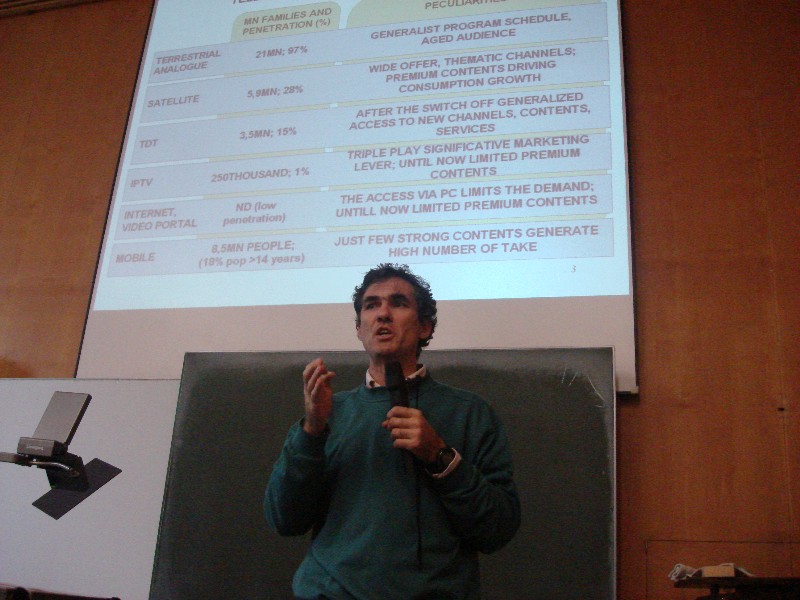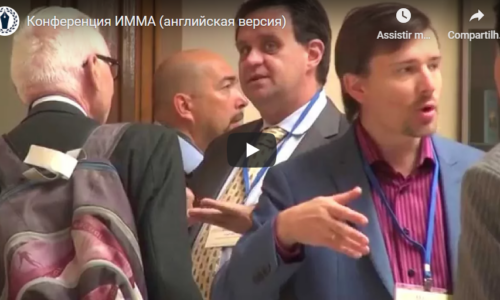2007 Saarbrücken
- IMMAA Communication
- January 31, 2007
- Conferences
- 0 Comments

To discuss the changes, challenges and chances of the different media branches and to find answers to the fundamental questions, IMMAA 2007 was focused on five different aspects of the media.
Participants / Topics
Starting Point
Session 1 – Goals and Leadership
Media management is the process of running a media business. Therefore it deals with media management as that science of management, which is related to “the media” and to the companies, creating or distributing these media. This track deals with the question “What are the relevant factors of a good strategic management in a media company?” The challenge is to find answers, which reflects the media (company) specific rules, originality, strong media specificity, completeness in object-coverage, integrative power, and the possibility of evaluation.
- Francisco Pérez-Latre: Moral Leadership, Creativity And Business Goals In Media Firms
- Erik Wilberg: Media Management Developments In Scandinavia
Part 1 / Part 2 - Uwe Eisenbeis: Corporate Goals In The Media Industry
Session 2 – Media Value Chain
Where and how do media (companies) create economic values? This is the ultimate question from a management perspective. New technologies, convergence processes and structural changes within the media industries increase the speed and efficiency of business transactions and processes: In addition, the internet economy leads to new markets by the creation of global marketplaces. This track discusses the effects and consequences of this transition process.
- Ute Schaedel: Why Users Generate Content – Theoretical And Empirical Findings On User’s Motivation To Online Production
- Marco Gambaro: Vertical Integration In Media Industries
- Volker Stein: Yield Management: Media Value Chain And Strategic Management
Session 3 – Consumers
This research track focuses on media consumers – the people who use media. The track is currently focused on three major areas: Media consumers – definitions and perspectives, audience measurement, historical and critical perspectives. Thus the track should give more answers to the questions: What do we need to know about consumers? Are there gaps in our knowledge? Who benefits from certain definitions of media consumers or media audiences? In which ways media companies use knowledge and data about consumers?
- Andrea Gröppel-Klein/Claas Christian Germelmann: When More Might Be Less: Can Advertisement Improve the Impact of Positive Media Content on a Brand
- Limor Peer: Exploring Media Experiences: How (and why) Teens use news online
- Ed Malthouse: Measuring Engagement Across Four Kinds of Media
Session 4 – Media Management Theory/Characteristics of the media and media products
This track focuses the well known idea, that media products are characterized by some special characteristics with impact for economic aspects of the media firm, especially for the design of business models and the development of markets. The span of the common understanding of what media management really is and which aspects have to be considered is increasing more than ever. And: There is a need for frameworks and concepts to deal with media management (theory). This track is looking for a common understanding of constitutive basis.
- Paul Murschetz: Theorizing the Paradigm of Market Failure – A Literature Review and some Critical Observations on ist Validity for the Media Sector
- Mary Alice Shaver/Dan Shaver: Disappearing Boundaries: The Challenge for Media Research
- Christian Scholz: Successful Strategic Management within the Media Firm. A Proposed Framework and a Case Study
Session 5 – New Technologies
Currently the competition about new technologies is not always about the best technologies, but especially about technologies that are economically justifiable. Technology is supportive for the media companies’ core business as well as it is constitutive for new applications and business models. This tracks deals with the idea of technology as an enabler and driving force.
- Jan Björk: Strategic Market Challenges from Mobile Music Services
- Àges Urbán: Market Potential of Mobile Television
- Claudia Loebbecke/Oliver Huyskens: RFID in Media: Trials in the Japanese Publishing Industry
Student Day
The “Student Day” should be a new way to exchange the idea how to teach media management.
Three international professors (from different countries) gave a mini-lecture in their style with some of the students. Of course IMMAA-attendees are also in the auditorium.
- Risk Management for New Media Ventures
- Measuring Engagement with Editorial Content
- Television Economics and Business Models
Many Thanks to Armin Rott, Ed Malthouse and Marco Gambaro for their presentations.
Conference Location
Saarbrücken, with a population of around 200,000, has many unique features to offer. The capital of Saarland (one of the federal states of Germany; watch image video about the Saarland provided by the government on www.english.saarland.de/) is situated at the heart of the European Union: the European cities of Brussels, Luxembourg and Strasbourg are all within a radius of about 300 km. Frankfurt with it´s international airport is about 90min away from Saarbruecken. Saarbruecken, as a commercial and trade fair center, maintains close relations with its European neighbors France and Luxembourg in a region where these countries meet. Saarbruecken’s cosmopolitan flair is just one reason why its arts world and cultural scene have something to offer for all tastes. The restored castle, with its terraces from which visitors can enjoy a magnificent view over the River Saar, is a sight that no-one should miss. In the bars and cafes of Saarbruecken’s old town, visitors find a cosy atmosphere. In particular, the street cafés in the old town’s narrow streets are renowned for their mediterranean atmosphere during the summer months.
More about …
Saarland University: www.uni-saarland.de/en
Saarbruecken: www.saarbruecken.de/en
the German state Saarland: www.english.saarland.de
The University campus, situated in an idyllic forest, five minutes away from the center of Saarbrücken, was founded in 1946. In the meantime, a place of learning has emerged where currently 15,500 students study a wide variety of subjects.
Saarbruecken is a small, but very idyllic place, for hosting the IMMAA-conference 2007. And it has strong connections to media industry and media research.
The International Media Management Academic Association 2007 was hosted by orga.uni-sb.de at the Saarland University.
Publication
The media industry has become an increasingly fascinating sector for students, researchers and practitioners alike. During the past decade it has come to be seen as one of the fastest growing and most powerful industries in the world. There is a correspondingly growing need for professional and media-specific management tools to monitor its development.
Based on the desire to provide professional and actionable knowledge to media managers as well as specific teaching concepts for Media Management teachers and students alike, the book “Looking to the Future of Modern Media Management – changes | challenges | opportunities” examines current media management issues through the lens of two not uncomplementary perspectives: that of the media’s researchers (theory) and that of its workforce (practice). Both perspectives maintain a strong management focus.
The book contains 22 contributions covering issues from current and forthcoming media management challenges, country-specific media management analysis, developments in the media value chain, new insights into media consumer behavior as well as various outlooks and recommendations for the future of media management, written by media management practitioners and academics.



